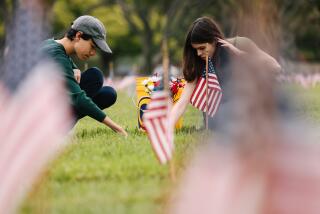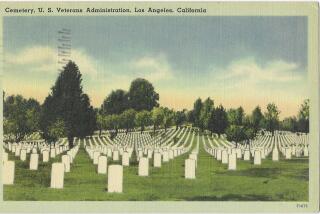Bob Hope Honored on His 99th Birthday
- Share via
Bob Hope, who entertained 10 million troops over more than five decades of globe-trotting USO tours, was honored on his 99th birthday Wednesday in a way befitting the nation’s only “honorary veteran,” with the dedication of the Bob Hope Veterans Chapel at the Los Angeles National Cemetery.
Earlier in the day, President Bush, just back from his European tour, signed legislation authorizing the renaming of the Depression-era chapel in West Los Angeles. The act, passed by the House and Senate this month, was necessary to get around some hurdles, notably that the British-born honoree never served in the U.S. military. Oh, yes, and he’s still alive.
“It’s not ordinary to name national landmarks after living persons, unless they are living legends,” said U.S. Rep. Christopher Cox (R-Newport Beach), who attended along with other dignitaries, including Gen. William Westmoreland, commander of U.S. forces in Vietnam.
Hope was too frail to leave his Toluca Lake home, but his wife, Dolores, who turned 93 on Monday, took the stage at the burial ground known as “Arlington West.”
Provoking the same sort of laughter-and-tears response that was the hallmark of a Hope show, speakers recalled that the comedian seldom spent a Christmas at home, preferring to traipse the world to entertain soldiers, sailors and Marines in places few people had ever heard of.
Debbie Reynolds, who toured with Hope, said she spoke on behalf of “Bob’s fellow entertainers,” noting, “I’m one of the few that’s still alive.” She was one of several to close her remarks with “thanks for the memories.”
Mort Lachman, a veteran of “Hope’s Army” who wrote, directed and produced such TV hits as “All in the Family,” noted that the Hopes were “married some 70 years, and that includes the three weeks he was home.”
Lachman told the audience of more than 200 that Dolores Hope raised her four children all by herself.
“She’d point at the tube and say, ‘See that man there, swinging the golf club? That’s your father.’”
Among other celebrities present were Red Buttons, Cyd Charisse and Connie Stevens. As Anthony J. Principi, U.S. secretary of Veterans Affairs, was making the dedication official, he halted as seven World War II-vintage Condor planes flew over in tribute.
Throughout more than 60 tours, Hope and an ever-changing band of Hollywood gypsies performed about 10,000 shows, from Sicily to Danang to Saudi Arabia.
With just two exceptions during World War II, all of Hope’s radio shows were aired from military bases and installations.
His first trip into a combat zone took place in 1943, when he and a small USO troupe visited facilities in England, Africa, Sicily and Ireland.
He was known as GI Bob, a moniker made more official in 1997, when Congress designated him an honorary veteran for his indefatigable efforts to boost soldiers’ morale in faraway places. He is the only civilian ever to have received that honor.
The chapel that now bears his name was designed in 1938. It stands at Wilshire and Sepulveda boulevards, part of 114.5 acres that serve as the final resting place for 85,000 soldiers.
The 4,558-square-foot Spanish Revival-style building houses administrative offices, archival exhibits and a medal display. It now sports a plaque, with a likeness of Hope and an inscription “on behalf of all Veterans whose lives were touched by this legendary performer.”
Largely unchanged since 1940, the building needs $2.1 million in repairs, according to the Veterans Park Conservancy, a nonprofit group founded in 1986 to help manage Veterans Park. The organization plans to refurbish the chapel with a mix of public and private funds.
In honor of the renaming ceremony, the conservancy mounted a “Hope’s Army” retrospective. It featured framed letters from soldiers, sailors and others who had written to Hope over the years to say how he had made them laugh when they felt like crying.
One such letter was from a Minnesota mother who related what her son had written from the Solomon Islands after Hope’s entourage stopped there in 1944.
Hope and the others were “a scream,” the young man wrote, and the female entertainers were “beautiful,” but he couldn’t figure out why they would come “to a weather-beaten hole like this.”
The 19-year-old Marine died soon after, in his first battle.
“I can never thank you enough,” his mother wrote Hope, “for having brought him those two hours of fun.”
More to Read
Sign up for Essential California
The most important California stories and recommendations in your inbox every morning.
You may occasionally receive promotional content from the Los Angeles Times.














